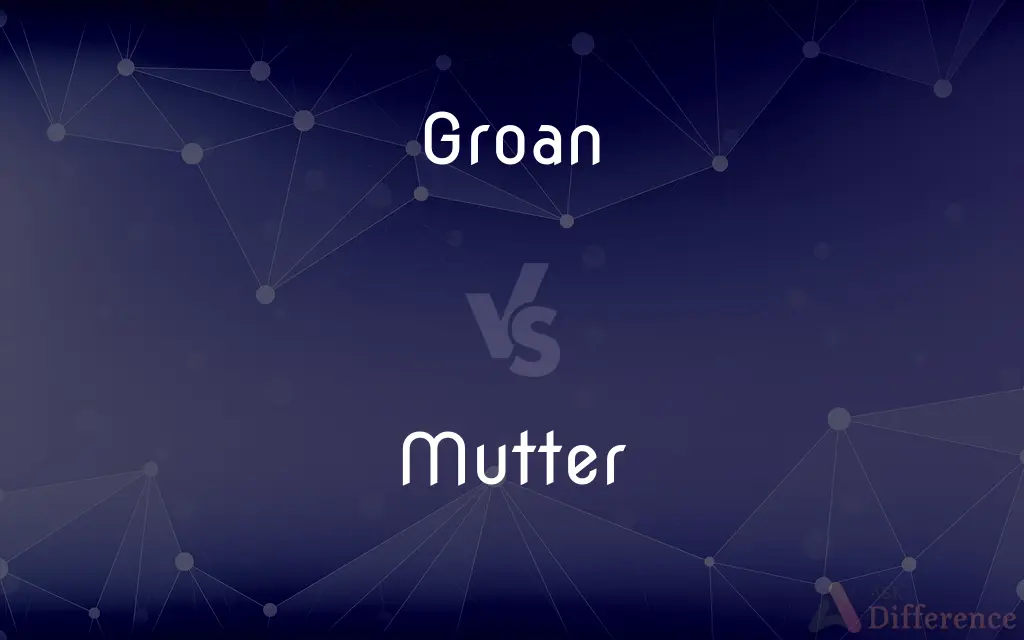Groan vs. Mutter — What's the Difference?
By Fiza Rafique & Maham Liaqat — Updated on May 4, 2024
A groan expresses displeasure or pain through a deep, long sound, while mutter involves speaking softly and indistinctly under the breath.

Difference Between Groan and Mutter
Table of Contents
ADVERTISEMENT
Key Differences
Groan is often a response to physical or emotional discomfort, characterized by a low, guttural vocalization that might seem drawn from deep within. Whereas mutter is typically associated with dissatisfaction or secrecy, characterized by a low, murmuring sound that is often unintelligible to others.
Groaning can be involuntary, emerging naturally during experiences of discomfort or exertion. On the other hand, muttering is generally a deliberate act, albeit sometimes a barely conscious one, where the speaker's words are subdued and often directed inward rather than meant for clear communication.
In social contexts, a groan is usually understood by others as an expression of distress or reluctance. Whereas a mutter might go unnoticed or be perceived as suspicious or rude, since it can suggest that the speaker is hiding their true thoughts or feelings.
Groans do not usually form coherent words; they are non-verbal sounds that communicate a general feeling. In contrast, mutters, although quiet and unclear, are composed of actual words or phrases that are not fully articulated or projected.
In literature and media, groans are used to express a character's response to a physical or emotional burden. Muttering, however, is often employed to depict a character's frustration or to provide an audience with insight into a character's thoughts without other characters hearing them.
ADVERTISEMENT
Comparison Chart
Definition
A deep, long sound expressing discomfort.
Speaking in a low, indistinct voice.
Voluntariness
Often involuntary.
Generally voluntary but can be habitual.
Communication Type
Non-verbal, emotive.
Verbal, subdued.
Social Perception
Sign of distress or pain.
Can be seen as secretive or rude.
Usage in Literature/Media
Used to show physical/emotional burden.
Shows inner thoughts or mild frustration.
Compare with Definitions
Groan
A sound indicating pain or displeasure.
She let out a groan as she lifted the heavy box.
Mutter
To speak in a low, barely audible tone.
She muttered an apology, barely audible.
Groan
A sound of mechanical stress.
The old door groaned as it opened.
Mutter
A form of speaking without clear articulation.
She muttered to herself while searching for the book.
Groan
To express despair or difficulty through a vocal sound.
The students groaned when assigned more homework.
Mutter
To recite something under one's breath.
He muttered a quick prayer before the performance.
Groan
To complain audibly.
He groaned about the long wait at the doctor's office.
Mutter
To say something indistinctly and quietly.
He muttered the instructions, causing confusion.
Groan
To make a deep, inarticulate sound in response to discomfort.
He groaned under the weight of the backpack.
Mutter
To express discontent quietly.
They muttered about the changes in policy.
Groan
To voice a deep, inarticulate sound, as of pain, grief, or displeasure.
Mutter
Say something in a low or barely audible voice, especially in dissatisfaction or irritation
‘I knew she was a troublemaker,’ Rebecca muttered
He muttered something under his breath
Groan
To make a sound expressive of stress or strain
Floorboards groaning.
Mutter
A barely audible utterance, especially one expressing dissatisfaction or irritation
A little mutter of disgust
Groan
To utter or express with groans or a groan.
Mutter
To speak indistinctly in low tones.
Groan
The sound made in groaning.
Mutter
To complain or grumble morosely.
Groan
A low, mournful sound uttered in pain or grief.
Mutter
To utter or say in low indistinct tones.
Groan
A low, guttural sound uttered in frustration, disapproval, or ecstasy.
Mutter
A low grumble or indistinct utterance.
Groan
A low creaking sound from applied pressure or weight.
Mutter
A repressed or obscure utterance; an instance of muttering.
The prisoners were docile, and accepted their lot with barely a mutter.
Groan
To make a groan.
We groaned at his awful jokes.
The wooden table groaned under the weight of the banquet.
Mutter
(Indian cuisine) Peas.
Groan
(figurative) To seemingly creak under the strain of being heavily laden.
Mutter
To utter words, especially complaints or angry expressions, indistinctly or with a low voice and lips partly closed; to say under one's breath.
You could hear the students mutter as they were served sodden spaghetti, yet again, in the cafeteria.
The beggar muttered words of thanks, as passersby dropped coins in his cup.
Groan
(obsolete) To strive after earnestly, as if with groans.
Mutter
To speak softly and incoherently, or with imperfect articulations.
The asylum inmate muttered some doggerel about chains and pains to himself, over and over.
Groan
To give forth a low, moaning sound in breathing; to utter a groan, as in pain, in sorrow, or in derision; to moan.
For we . . . do groan, being burdened.
He heard the groaning of the oak.
Mutter
To make a sound with a low, rumbling noise.
April could hear the delivery van's engine muttering in the driveway.
Groan
To strive after earnestly, as with groans.
Nothing but holy, pure, and clear,Or that which groaneth to be so.
Mutter
To utter words indistinctly or with a low voice and lips partly closed; esp., to utter indistinct complaints or angry expressions; to grumble; to growl.
Wizards that peep, and that mutter.
Meantime your filthy foreigner will stare,And mutter to himself.
Groan
To affect by groans.
Mutter
To sound with a low, rumbling noise.
Thick lightnings flash, the muttering thunder rolls.
Groan
A low, moaning sound; usually, a deep, mournful sound uttered in pain or great distress; sometimes, an expression of strong disapprobation; as, the remark was received with groans.
Such groans of roaring wind and rain.
The wretched animal heaved forth such groans.
Mutter
To utter with imperfect articulations, or with a low voice; as, to mutter threats.
Groan
An utterance expressing pain or disapproval
Mutter
Repressed or obscure utterance.
Groan
Indicate pain, discomfort, or displeasure;
The students groaned when the professor got out the exam booklets
The ancient door soughed when opened
Mutter
A low continuous indistinct sound; often accompanied by movement of the lips without the production of articulate speech
Mutter
A complaint uttered in a low and indistinct tone
Mutter
Talk indistinctly; usually in a low voice
Mutter
Make complaining remarks or noises under one's breath;
She grumbles when she feels overworked
Common Curiosities
Is muttering considered rude?
It can be perceived as such, especially if it seems like the speaker is concealing thoughts.
Can a groan be verbal?
Typically, it's non-verbal but expressive of a broad sentiment.
Why do people mutter?
Often to express dissatisfaction or thoughts not meant for others.
What does a groan typically indicate in a social setting?
Discomfort, reluctance, or dissatisfaction.
What might prompt someone to mutter rather than speak openly?
Discretion, dissatisfaction, or a habit of subdued speech.
How is groaning depicted in literature?
As a natural response to adversity or burden.
Can groans be controlled?
They are often spontaneous and harder to control than mutters.
What is the primary use of a groan?
To express physical or emotional discomfort.
Is there any physical pain associated with muttering?
No, it's more about subdued verbal expression.
Are mutters always meant to be heard by others?
Usually, they are not intended for others to hear clearly.
Share Your Discovery

Previous Comparison
Embark vs. Embrace
Next Comparison
Plague vs. PlaqueAuthor Spotlight
Written by
Fiza RafiqueFiza Rafique is a skilled content writer at AskDifference.com, where she meticulously refines and enhances written pieces. Drawing from her vast editorial expertise, Fiza ensures clarity, accuracy, and precision in every article. Passionate about language, she continually seeks to elevate the quality of content for readers worldwide.
Co-written by
Maham Liaqat















































